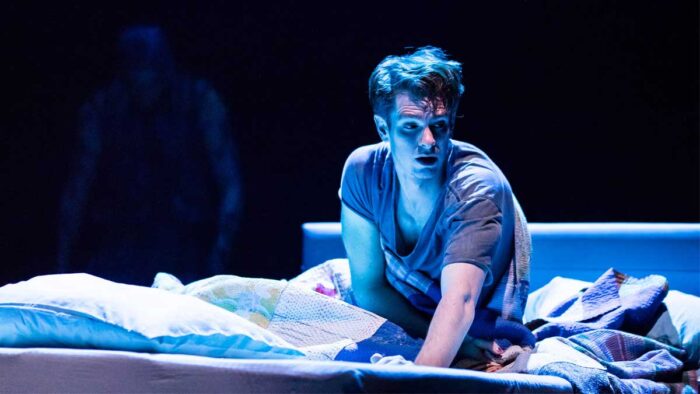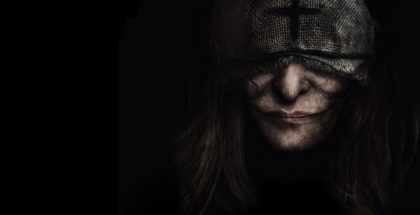National Theatre at Home review: Angels in America
Review Overview
Cast
10Production
10Play
10David Farnor | On 25, Feb 2021
“Fuck you! I’m a prophet.” That’s Prior Walter (Andrew Garfield) in Angels in America to his former boyfriend, Louis (James McArdle). Louis leaves Prior early on in Tony Kushner’s play, after Prior reveals that he has been diagnosed with HIV – leaving Louis to panic and flee in fear. And Prior is, in some way, a prophet. Before the first half of the seven-hour, two-part masterpiece, he’s been approached by angel, keen to petition him to ask humankind to stop changing and stay as it is. But Prior is also one of the few characters we meet who is honest about who he is – even though that includes being open about his sexuality, and being gay is considered unacceptable in conservative 1980s America.
This is the era of Ronald Reagan as well as the Aids crisis, a time of painful loss as well as tragic denial. Embodying everything successful in this aid of politics, business and tradition is Roy Cohn (Nathan Lane), a lawyer who worked with Joseph McCarthy, Donald Trump and Rupert Murdoch before he passed away from Aids-related complications 1986. Lane plays him with larger-than-life charisma, loud and boisterous confidence and a seething self-hatred – he’s a fascinating ball of conflict and complexities, while also emphasising the raging injustice at the heart of society; as Prior proceeds to suffer without support, Cohn manages to procure the retroviral drug AZT, drawing the line between the well-connected and the have-nots with a lethal clarity.
Kushner juxtaposes the story of Prior and Louis with that of Joe Pitt (Russell Tovey) and his wife, Harper (Denise Gough). Raised by a strict Mormon mother, Joe is incapable of openly admitting that he is gay, and that constant frustration, denial and unhappiness eats away at him – and leaves his wife addicted to Valium.
Gradually, over the epic runtime, these separate lives begin to collide and interweave, in some places contrasting and in others overlapping, often in ways you don’t expect. People have friends in surprising – or not so surprising places – but whether they know each other not, the entire ensemble is joined by the fear and uncertainty of the time. While some aspects of the play may seem dated 30 years after it debuted, it still resonates with grief and vulnerability.
Director Marianne Elliott (who gave us the innovative The Curious Incident of the Dog in the Night-Time) brings it all to life with an astonishing vividness, finding dazzling contemporary imagination in Kushner’s ideas. The depiction of the angel, played by a booming Amanda Lawrence, is particularly jaw-dropping, with a horde of shadowy figures moving around the stage with her to achieve her glorious, terrifying wingspan. She bellows with ominous warning but also with a quiet jealousy of humans, and that sense of inequality seeps into all elements of the fantastical production, which sweeps us from one neighbourhood and plane of existence to another.
It’s to the cast’s credit that Lawrence doesn’t eclipse everyone else on stage. There’s a beautifully fierce intensity to the performances, from Lane’s Cohn who finds a pitiful agony in his impending demise, and Garfield’s Prior, who is as camp and defiant as he is heart-wrenchingly desperate, to James McArdle’s Louis, who combines guilt with a hidden loyalty, and a scene-stealing Nathan Stewart-Jarrett as Belize, a fabulous drag queen who becomes Cohn’s night nurse and forms an unlikely link between Prior and the lawyer – while Prior, too, finds a connection with a surprising female figure. Throughout, Susan Brown brings nuance and even kindness to Joe Pitt’s stoic, rigid matriarch.
The result is a dizzying, colourful collage of humans burning with precious life, a mosaic of life, death, love, sex, a tapestry of heaven and Earth that depicts the difference between selfishly tolerating others and actively showing compassion to help them, a study of old conventions and new ways of living, of moving forward together to find a future in a community forged through forgiveness. It’s as much rooted to its own time as it is timelessly relevant. Art doesn’t get more prophetic than that.
Angels in America is available on National Theatre at Home as a £7.99 rental or as part of a £9.98 monthly subscription. For more on National Theatre at Home and how it works, click here.
















